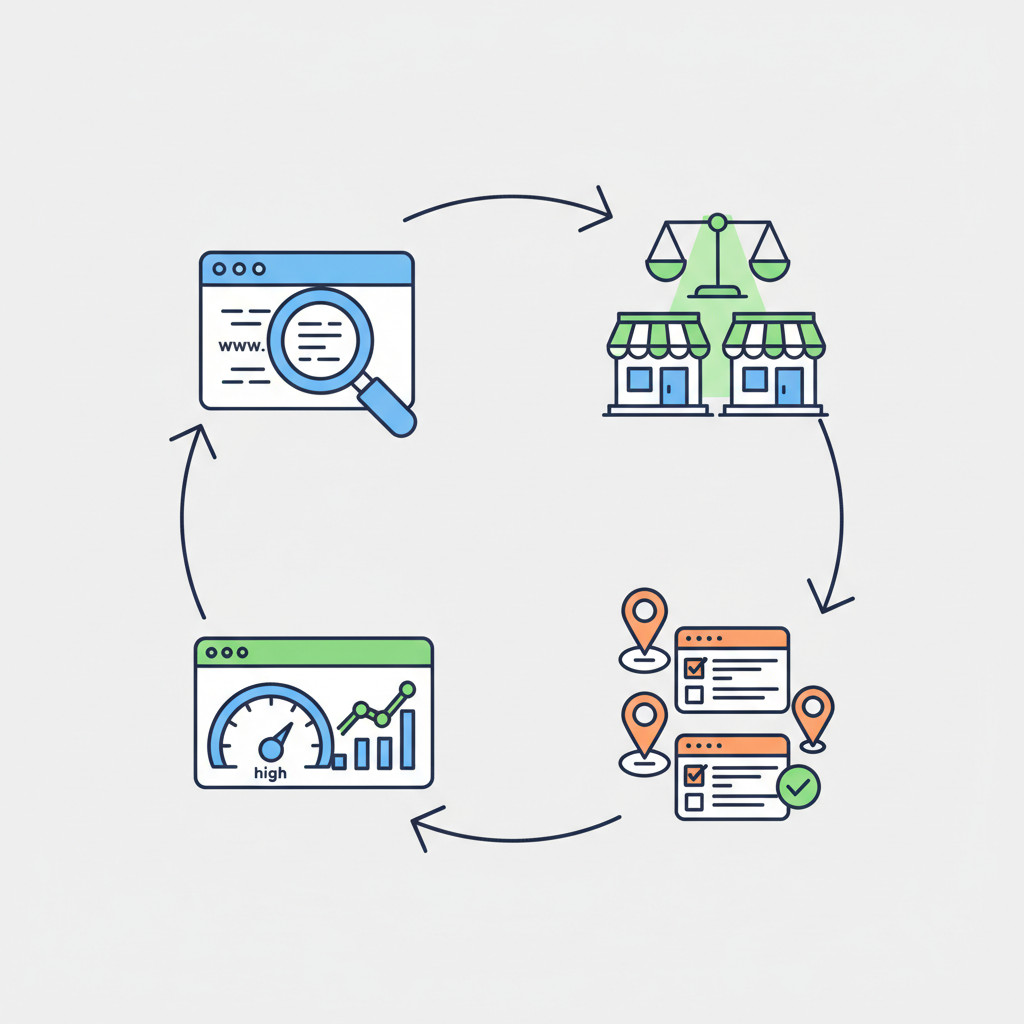Introduction
A local SEO audit can make or break a neighborhood business’s visibility online. Because search engines now blend traditional results with AI Overviews, local signals matter more than ever. Small tweaks to your Google Business Profile and website can increase foot traffic and conversions. This guide shows a practical, repeatable local SEO audit and an 11 point checklist.
Read on to learn what this blog covers and why each item matters
- Google Business Profile signals and review management because reviews influence AI Overviews.
- Also, website crawlability and indexability including schema markup and server side rendering for JavaScript heavy sites.
- Content and link audits for topical relevance and local backlinks from chambers and local publishers.
- An 11 point local SEO audit checklist you can run every six to 12 months.
- Actionable prompts and tips to optimize for AI Mode and Google Gemini.
This post is for agencies, marketers, and local business owners. Therefore we focus on visibility, trust, and measurable impact. It gives tactical steps you can implement quickly and measure.
Why a local SEO audit matters
A local SEO audit gives a clear snapshot of how customers find your business online. Because search results now include AI Overviews and AI Mode, local signals shape visibility. Therefore an audit helps prioritize Google Business Profile, citations, on page signals, and content quality.
- Improve rankings in the local pack and organic results.
- For example, fixing NAP inconsistencies increases citation trust.
- Also, better schema markup helps AI Overviews understand offers.
- As a result, you drive more calls, visits, and conversions.
How a local SEO audit improves visibility
An audit inspects technical crawlability, indexability, and content structure. For JavaScript heavy sites, use server side rendering or pre rendered HTML. See Google’s JavaScript SEO Basics for details. Also validate structured data with Google’s guidelines at Google’s Structured Data Guidelines.
Run a local SEO audit every six to 12 months or after major site changes. Moreover, use data from Google Search Console and Google Analytics to measure keyword performance and user paths. In short, a repeatable local SEO audit checklist helps agencies and local business owners boost visibility, authority, and customer engagement.
Related keywords and terms include local SEO audit checklist, Google Business Profile, GBP, crawlability, indexability, schema markup, citations, NAP, backlinks, reviews, and content audit.

Image shows a four step local SEO audit workflow: website analysis, competitor evaluation, citation checks, and performance review. The diagram uses flat vector icons and a simple clockwise flow to make the process easy to scan.
Local SEO audit: step by step
A local SEO audit breaks complex work into simple actions. Therefore you can spot issues fast and improve visibility. Follow these steps and use data to prioritize fixes.
- Check your Google Business Profile and NAP accuracy
- Verify business name, address, phone, and hours. Because consistency builds citation trust, fix mismatches immediately. Also respond to key reviews to improve engagement.
- Crawl and indexability review
- Use Google Search Console to check indexing, coverage, and URL errors. Also confirm mobile and desktop performance data. For JavaScript sites, consider server side rendering to improve LLM crawlability.
- On page content and schema audit
- Review title tags, meta descriptions, and headers for local keywords. Moreover add structured data where relevant. This helps AI Overviews understand services and locations.
- Image and media optimization
- Ensure images use descriptive filenames and alt text. Also compress files to speed load times and improve Core Web Vitals.
- Citation and local listings check
- Audit major directories and local citations for NAP consistency. As a result, you reduce conflicting signals and raise local trust.
- Competitor and backlink review
- Compare local competitors for content, links, and GBP strategy. Then pitch local publishers for authoritative backlinks to boost rankings.
- Reviews, Q and A, and FAQ structure
- Audit review volume and sentiment. Also add FAQ sections on product pages to help AI search surface answers.
- Performance and analytics validation
- Use Google Analytics to confirm user paths and conversions. Therefore prioritize pages that drive the most value.
Local SEO audit tools and actionable tips
- Google Business Profile: manage your listing at Google Business Profile. Tip: Save changes and monitor insights.
- Moz Local: check citations and duplicate listings at Moz Local. Tip: Export reports to track fixes.
- BrightLocal: run local audits and rank tracking at BrightLocal. Tip: Schedule automated reports for six to 12 month reviews.
- Google Search Console: diagnose indexing and search queries at Google Search Console. Tip: Focus on pages with high impressions but low clicks.
- Google Analytics: validate conversions and user flows at Google Analytics. Tip: Create segments for local traffic.
- Lighthouse: test performance and Core Web Vitals at Lighthouse. Tip: Fix high impact issues first.
Use this checklist to build a repeatable local SEO audit process. Repeat audits every six to 12 months or after major site changes to protect local visibility.
local SEO audit tools comparison
Choosing the right local SEO audit tool speeds up audits and improves results. Therefore you save time and spot issues faster. Below is a clear comparison of popular tools and key features. Use this to match tool strengths to your workflow and budget.
| Tool | Ease of use | Pricing | Accuracy | Additional functionalities |
|---|---|---|---|---|
| Google Business Profile | High for single listings | Free | Excellent for GBP data | Direct profile management and insights |
| Moz Local | Easy setup | Mid tier subscription | Good for citation accuracy | Citation management and duplicate detection |
| BrightLocal | Intuitive dashboard | Mid tier with flexible plans | Strong local ranking data | Local rank tracking and citation building |
| Whitespark | Moderate learning curve | Pay per service and subscription | High for citation discovery | Local citation finder and link prospecting |
| SEMrush Local or SEMrush | User friendly for SEOs | Higher tier with many tools | Strong for backlink and keyword data | Comprehensive SEO tools and reporting |
Choosing the right local SEO audit tool
First, test a tool on one location. This helps you compare real output and accuracy. Next, evaluate time to value and reporting options. Also check automation and scheduling for repeat audits. Finally, consider integration with Google Search Console and analytics tools.
Actionable tip: start with free Google Business Profile checks. Then add a citation tool for scale. As a result you get reliable local signals and a repeatable audit process.
Conclusion
Running a local SEO audit reveals gaps that stop customers from finding you. Because it checks GBP signals, citations, crawlability, and content, it improves visibility. Measure impact with Google Search Console and Analytics. As a result, businesses see higher local rankings and more customer actions.
An audit also strengthens conversions and customer engagement by improving clarity and trust. Moreover, combining audit findings with AI tools speeds responses and reduces support costs. Velocity Plugins builds AI driven WooCommerce plugins that increase conversions and cut support time. Their flagship product, Velocity Chat, answers product questions, suggests upsells, and frees staff time.
Try a repeatable local SEO audit every six to 12 months to keep momentum. Then pair results with tools such as Velocity Chat to automate customer interactions. Explore Velocity Plugins products and learn how AI can lift conversions and lower costs. Contact Velocity Plugins to request a demo and implementation plan. Start your audit today and turn local search into steady revenue.
Frequently Asked Questions (FAQs)
What does a local SEO audit cover?
A local SEO audit reviews your Google Business Profile, citations, on page SEO, technical crawlability, and backlinks. It also checks images, schema, and review signals to improve local relevance.
How often should I run a local SEO audit?
Therefore, run an audit every six to 12 months or after big site changes. Also run quick checks after major review or Google Business Profile edits.
Will a local SEO audit increase my rankings?
Yes. Fixing NAP inconsistencies, schema, and technical issues improves rankings. As a result you often see better local pack placement and more local traffic.
What tools do I need for an audit?
Start with Google Business Profile and Google Search Console. Then add citation tools and analytics. For scale, use Moz Local or BrightLocal for citation management.
How long before I see results?
Small fixes can show impact in weeks. However larger changes take two to three months to show steady gains. Track results with Search Console and Analytics.



